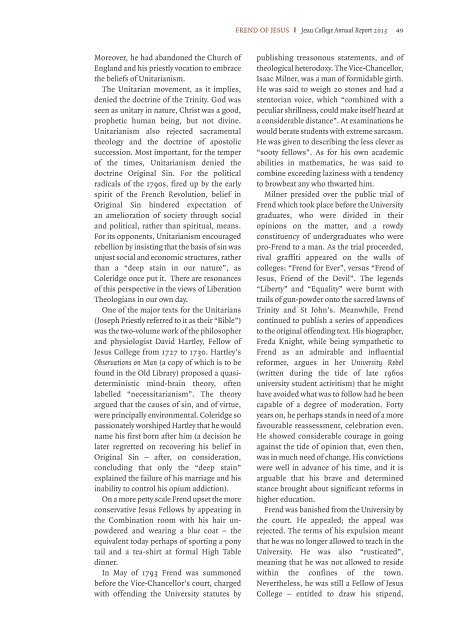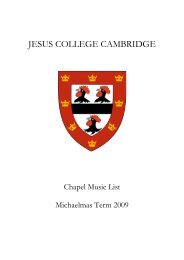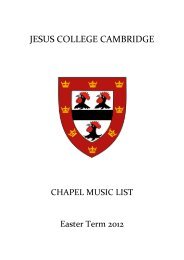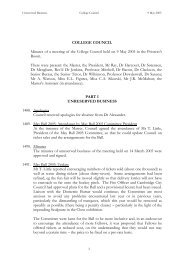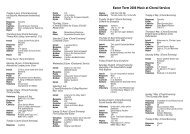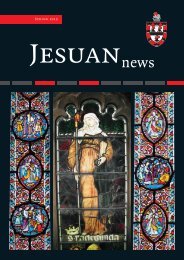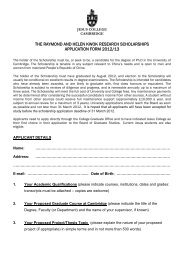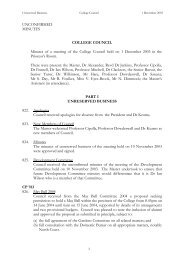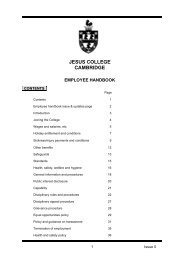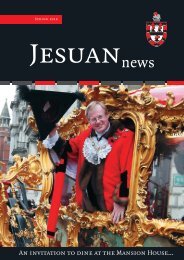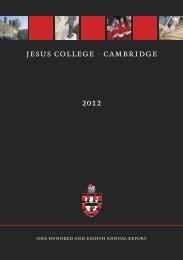2013 Annual Report - Jesus College - University of Cambridge
2013 Annual Report - Jesus College - University of Cambridge
2013 Annual Report - Jesus College - University of Cambridge
Create successful ePaper yourself
Turn your PDF publications into a flip-book with our unique Google optimized e-Paper software.
FREND OF JESUS I <strong>Jesus</strong> <strong>College</strong> <strong>Annual</strong> <strong>Report</strong> <strong>2013</strong> 49<br />
Moreover, he had abandoned the Church <strong>of</strong><br />
England and his priestly vocation to embrace<br />
the beliefs <strong>of</strong> Unitarianism.<br />
The Unitarian movement, as it implies,<br />
denied the doctrine <strong>of</strong> the Trinity. God was<br />
seen as unitary in nature, Christ was a good,<br />
prophetic human being, but not divine.<br />
Unitarianism also rejected sacramental<br />
theology and the doctrine <strong>of</strong> apostolic<br />
succession. Most important, for the temper<br />
<strong>of</strong> the times, Unitarianism denied the<br />
doctrine Original Sin. For the political<br />
radicals <strong>of</strong> the 1790s, fired up by the early<br />
spirit <strong>of</strong> the French Revolution, belief in<br />
Original Sin hindered expectation <strong>of</strong><br />
an amelioration <strong>of</strong> society through social<br />
and political, rather than spiritual, means.<br />
For its opponents, Unitarianism encouraged<br />
rebellion by insisting that the basis <strong>of</strong> sin was<br />
unjust social and economic structures, rather<br />
than a “deep stain in our nature”, as<br />
Coleridge once put it. There are resonances<br />
<strong>of</strong> this perspective in the views <strong>of</strong> Liberation<br />
Theologians in our own day.<br />
One <strong>of</strong> the major texts for the Unitarians<br />
(Joseph Priestly referred to it as their “Bible”)<br />
was the two-volume work <strong>of</strong> the philosopher<br />
and physiologist David Hartley, Fellow <strong>of</strong><br />
<strong>Jesus</strong> <strong>College</strong> from 1727 to 1730. Hartley’s<br />
Observations on Man (a copy <strong>of</strong> which is to be<br />
found in the Old Library) proposed a quasideterministic<br />
mind-brain theory, <strong>of</strong>ten<br />
labelled “necessitarianism”. The theory<br />
argued that the causes <strong>of</strong> sin, and <strong>of</strong> virtue,<br />
were principally environmental. Coleridge so<br />
passionately worshiped Hartley that he would<br />
name his first born after him (a decision he<br />
later regretted on recovering his belief in<br />
Original Sin – after, on consideration,<br />
concluding that only the “deep stain”<br />
explained the failure <strong>of</strong> his marriage and his<br />
inability to control his opium addiction).<br />
On a more petty scale Frend upset the more<br />
conservative <strong>Jesus</strong> Fellows by appearing in<br />
the Combination room with his hair unpowdered<br />
and wearing a blue coat – the<br />
equivalent today perhaps <strong>of</strong> sporting a pony<br />
tail and a tea-shirt at formal High Table<br />
dinner.<br />
In May <strong>of</strong> 1793 Frend was summoned<br />
before the Vice-Chancellor’s court, charged<br />
with <strong>of</strong>fending the <strong>University</strong> statutes by<br />
publishing treasonous statements, and <strong>of</strong><br />
theological heterodoxy. The Vice-Chancellor,<br />
Isaac Milner, was a man <strong>of</strong> formidable girth.<br />
He was said to weigh 20 stones and had a<br />
stentorian voice, which “combined with a<br />
peculiar shrillness, could make itself heard at<br />
a considerable distance”. At examinations he<br />
would berate students with extreme sarcasm.<br />
He was given to describing the less clever as<br />
“sooty fellows”. As for his own academic<br />
abilities in mathematics, he was said to<br />
combine exceeding laziness with a tendency<br />
to browbeat any who thwarted him.<br />
Milner presided over the public trial <strong>of</strong><br />
Frend which took place before the <strong>University</strong><br />
graduates, who were divided in their<br />
opinions on the matter, and a rowdy<br />
constituency <strong>of</strong> undergraduates who were<br />
pro-Frend to a man. As the trial proceeded,<br />
rival graffiti appeared on the walls <strong>of</strong><br />
colleges: “Frend for Ever”, versus “Frend <strong>of</strong><br />
<strong>Jesus</strong>, Friend <strong>of</strong> the Devil”. The legends<br />
“Liberty” and “Equality” were burnt with<br />
trails <strong>of</strong> gun-powder onto the sacred lawns <strong>of</strong><br />
Trinity and St John’s. Meanwhile, Frend<br />
continued to publish a series <strong>of</strong> appendices<br />
to the original <strong>of</strong>fending text. His biographer,<br />
Freda Knight, while being sympathetic to<br />
Frend as an admirable and influential<br />
reformer, argues in her <strong>University</strong> Rebel<br />
(written during the tide <strong>of</strong> late 1960s<br />
university student activitism) that he might<br />
have avoided what was to follow had he been<br />
capable <strong>of</strong> a degree <strong>of</strong> moderation. Forty<br />
years on, he perhaps stands in need <strong>of</strong> a more<br />
favourable reassessment, celebration even.<br />
He showed considerable courage in going<br />
against the tide <strong>of</strong> opinion that, even then,<br />
was in much need <strong>of</strong> change. His convictions<br />
were well in advance <strong>of</strong> his time, and it is<br />
arguable that his brave and determined<br />
stance brought about significant reforms in<br />
higher education.<br />
Frend was banished from the <strong>University</strong> by<br />
the court. He appealed; the appeal was<br />
rejected. The terms <strong>of</strong> his expulsion meant<br />
that he was no longer allowed to teach in the<br />
<strong>University</strong>. He was also “rusticated”,<br />
meaning that he was not allowed to reside<br />
within the confines <strong>of</strong> the town.<br />
Nevertheless, he was still a Fellow <strong>of</strong> <strong>Jesus</strong><br />
<strong>College</strong> – entitled to draw his stipend,


